




 |
   |
 |
 |
Dio at Donington UK: Live 1983 & 1987 [Disc 1] (2010, 46.33) ****/T |
|
| Stand Up and Shout Straight Through the Heart Children of the Sea Rainbow in the Dark Holy Diver Drum solo Stargazer Guitar solo |
Heaven and Hell Man on the Silver Mountain Starstruck Man on the Silver Mountain (reprise) |
|
Current availability:
Mellotron used:
Ronnie James Dio fell out with Black Sabbath in 1982 over the mixing of their double live Live Evil (who said 'Miles Davis'?), going on to form Dio, releasing Holy Diver the following year and securing a slot at that summer's Monsters of Rock at Donington racecourse. The band played there again four years later, by which time Dio (the man) had become an enduring metal icon, finding himself almost above criticism, however lame his studio output had become. Another two stints with Sabbath (the latter as Heaven & Hell) were to come, H&H's career fatally interrupted by Dio's death in 2010, aged sixty-eight.
Mere months after his death, the recording of both Donington sets appeared as the clumsily-titled Dio at Donington UK: Live 1983 & 1987, the '83 set, at least, reminding us of how vital the band were in their early days. Admittedly, they rely heavily on Ronnie's Sabbath and Rainbow past, playing a mere three tracks from their debut; 'crowd pleasing', I believe it's called. From what I remember of the day (a little; it was a long time ago...), they did precisely that; an excellent PR exercise that almost certainly boosted sales of both Holy Diver and their theatre tour that autumn.
Claude Schnell played offstage keys, including (I believe) Mellotron; Dio himself was certainly keen on the instrument, although I don't hear it on his studio albums. Anyway, we get choirs on Straight Through The Heart and Children Of The Sea, with a melodic part on the latter, although they're not obvious on Heaven And Hell, one of a handful of live Sabbath Mellotron tracks. So; do you love Ronnie James? Can you not get enough of his (admittedly huge) presence? This set's for you, then, although I wouldn't bother for its low-key Mellotron use.
See: Black Sabbath | Rainbow
 |
Taking Chances (2007, 65.56) *½/TT |
|
| Taking Chances Alone Eyes on Me My Love Shadow of Love Surprise Surprise This Time New Dawn |
A Song for You A World to Believe in Can't Fight the Feelin' I Got Nothin' Left Right Next to the Right One Fade Away That's Just the Woman in Me Skies of L.A. |
|
Current availability:
Mellotrons used:
Celine Dion? Er, what? Yup, 'fraid so; good ol' Celine's released an album with some bloody Mellotron on it. Her thirteenth English-language record, Taking Chances (guess what: it doesn't), features the usual bevy of producers, programmers, musicians, technicians, hairdressers etc., not to mention the makeup artist whose career-crowning glory is no doubt her achievement in getting Celine to look almost exactly like an alabaster model of herself on the cover. So, what's the music like? I hear you cry. Well, I've done my level best to avoid her earlier 'product', but I believe this isn't the first time she's released a collection of perfect, soulless AOR; the Big Rock Hair on the cover gives the game away, as does the near- (but not that near) breast-exposing pose.
Her musicians are far more interesting than the lady herself; names that leap out at me include Jamie Muhoberac, Pat Thrall ('digital editing', not guitar), Pat Leonard, Lucy Woodward, Jim Keltner (just another session, no doubt) and Canadian AOR god Aldo Nova, who also wrote one song. The names that interest us here, though, are ex-4 Non Blonde Linda Perry and Danish Mellotron god and Dizzy Mizz Lizzy star Tim Christensen. Both contribute material, too, as does on/off Soft Boy Kimberley Rew and, while the songwriters' names aren't familiar, second track in is her version of Heart's massive '80s hit, Alone. If this album were thirty-five minutes long and cut all the shitty ballads, I might just about be able to have it on in the background without writhing on the ground in pain, but it's over an hour and features several ballads, so you can probably imagine how I'm feeling right now, only just over halfway through.
Perry and Christensen both play Mellotron, amazingly, with flutes and strings on My Love, uncredited strings on Surprise Surprise and flutes on Right Next To The Right One and, while the rest of the album's strings work seems to be real, there's a slight question mark over the opening title track. Listen, despite three Mellotron tracks and the sainted Tim's involvement, I STRONGLY URGE you to go absolutely nowhere near this horrible album. Listening to it has made me a sadder but wiser person; actually I was lying about the wiser bit, as I'm quite sure I'd do exactly the same thing, given another chance. Very nasty indeed.
 |
Before the Dinosaurs (2011, 43.54) */½ |
|
| Geronimo (Jost & Damien radio mix) Reconnect Friends In Love With the World What it's Like Into the Wild Masterpiece Where the Wild Roses Grow |
America Recipe Superhuman Before the Dinosaurs |
|
Current availability:
Mellotron used:
Maria Louise "Aura Dione" Joensen's background is confused, to say the least: Faroese/French mother and Swedish/Spanish father, born in New York and grew up in Denmark. Has any of this anything to do with the utter awfulness of her second album, 2011's Before the Dinosaurs, tasteful, 'empowering' sleeve and all? Probably not. It really is a dreadful record, opening with Geronimo (Jost & Damien Radio Mix), the most obnoxious piece of overproduced, autotuned mainstream shite it's been my displeasure to hear in some time. Least appalling tracks? What It's Like is marginally less horrible than its compatriots, at least until the vile chorus, er, possibly Into The Wild... It's like polishing turds, I tell you.
Patrick Warren plays Mellotron on Recipe, with a brief string part that, quite honestly could've been played on pretty much anything. OK, not a triangle. This really is as bad as my description. Just don't.
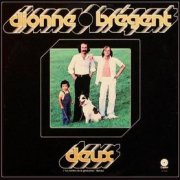 |
Deux (1977, 47.49) ****/T½OuvertureLe Prohète: Suite Fraternelle Dans la Mémoire du Temps Évocation de Rê Léthargie Chant Fraternel Danse Françoyse Gratte-Ciel Polyphonique/Postlude Campus Transit-Express |
Current availability:
Mellotron used:
Michel-Georges Brégent formed a duo with his brother, Jacques, in the early '70s, releasing one album, Poussières des Regrets, before teaming up with percussionist Vincent Dionne, releasing two albums, 1976's schizophrenic but brilliant Et le Troisième Jour (****) and the following year's Deux. Online reviewers seem to rate the former over the latter, which only goes to prove the old adage, 'horses for courses'; Et le Troisième Jour is nearer the avant-garde, while Deux is nearer to the progressive/electronic mainstream, such as it is. The near-side long Le Prohète: Suite Fraternelle is a beautiful piece, moving through several sections, combining keyboards and percussion in a quite unique way, making the duo difficult to compare to anybody else, while Campus and Transit-Express (also the name of a French fusion outfit of the time, so there may be a connection) are more energetic, with a jazz influence on the latter. The 2006 CD adds two bonus tracks, a Stockhausen percussion piece, Nr. 9 Zyklus and the truly excellent Fil De Terre, which both appear to predate the duo's debut, but are worth hearing.
Brégent's Mellotron is fairly hard to spot, as the album's strings appear to be produced by something else, although I've no idea what. There are no string players credited, so maybe it's creative use of a string synth? Hard to say, unless it's extremely cunning synth programming (not an impossibility). Two parts of Le Prohète: Suite Fraternelle seem to feature the instrument, with cellos on Danse Françoyse and flutes on Gratte-Ciel Polyphonique, plus strings on side two's Campus, juxtaposed with a real string section, making me wonder about those 'Mellotron' cellos. An inventive electronic/progressive album, then, most easily obtained alongside its predecessor on XXI-21's excellent 2-CD set, although hardly a Mellotron classic. Brégent made a second album with his brother in 1979, Pour Partir Ailleurs, also rumoured to contain Mellotron, although it seems it was actually an Orchestron. Sadly, he died in 1993, leaving Dionne to ensure that their work made it to CD, finally finding a worldwide audience in the process.
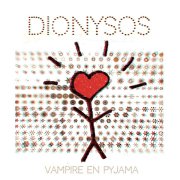 |
Vampire en Pyjama (2016, 38.09) ***/T |
|
| Chanson d'Été Guerrier de Porcelaine Vampire de l'Amour Hospital Blues L'Heure des Lueurs Skateboarding Sous Morphine Know Your Anemy I Follow Rivers |
Dame Ocles Le Petit Lion Déguisé en Moi Le Chant du Mauvais Cygne Vampire en Pyjama |
|
Current availability:
Mellotron used:
Two Dionysos albums already sit in the samples section; I'm not honestly sure I can say anything about the band I haven't already said there. Very French, very diverse, shifting seamlessly between chanson and r'n'b-inflected, groove-based material, at least on 2016's Vampire en Pyjama, their eighth album in a twenty-year career. Highlights? At least for this listener, the folkier end of their oeuvre works better, so maybe L'Heure Des Lueurs, I Follow Rivers and the ominous Dame Ocles, but little here actively offends.
Olivier Daviaud plays Mellotron, with flute parts on a handful of tracks: the closing seconds of Know Your Anemy sound clicky and wobbly enough to be real, particularly the point where the note begins to 'choke', although the repeating lines on Dame Ocles and the title track are indistinguishable from samples. Unless you're either a) already au fait with the band's catalogue or b) French, you probably aren't going to get an awful lot from this, but at least it's good at what it does.
See: Samples etc.
 |
Unfolded Like Staircase (1997, 64.54) ****½/TTT½ |
|
| Canto IV (limbo) Crutches The Carrot The Silent Mirror Down the Hatch Crutches Into the Dream Descent Chock Full o'Guts |
Drawn and Quartered Clearing Stealing the Key Sum Music Turtles All the Way Down Before the Storm The Ocean The Storm Eden |
|
Current availability:
Mellotron used:
The slightly cheekily-named Discipline's second album, Unfolded Like Staircase (it's a lyric quote, which doesn't make it any less odd) is an excellent piece of work, a pot pourri of progressive styles, the sax parts lending it a slightly Van der Graaf Generator air in places, while there's a constant King Crimson thing going on, although overall, it sounds more typically American than anything. Discipline are vocal/keyboard/sax/violin man Matthew Parmenter's band, so I've no idea how they managed to recreate this material live, although a more recent live album, Into the Dream... Discipline Live, proves that they could and did.
Parmenter has confirmed that he used real Mellotron on the album (picked up in Canada for a day's recording, with its owner, Chris Dale) and, it has to be said, he uses it with admirable taste and great restraint (there's next to none on Canto IV), although some of the more in-your-face parts include the end section of Crutches and the beginning of The Storm. I can't hear anything other than standard strings on the album, which seems slightly odd, as I'm sure the choirs would have worked in a few places, but that's obviously how he wanted it. I've heard a few people say they dislike this album, but unless you're totally stuck on '70s music from the '70s', I can't see how many progressive fans would have a problem with this. Highly recommended.
See: Samples etc. | Matthew Parmenter
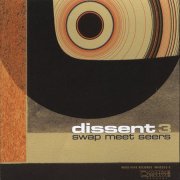 |
Swap Meet Seers (2004, 44.01) **½/0 |
|
| Time Trekker Je Me Souviens Coming of Wage Somewhere Up There Where Lost is Found Off-Kilter Dangling Strings Buhdust |
String Theory Angels Draft 2005 L'Ame Celeste |
|
Current availability:
Mellotron used:
Dissent are (or possibly were) a San Francisco Bay Area collective, numbering at least a dozen members, whose third album, Swap Meet Seers (or Dissent 3: Swap Meet Seers) seems to be the West Coast's answer to British trip-hop, its twelve tracks moving through a series of dreamlike states, often with female French-language vocals (did I hear someone say, "Stereolab"? Or, for that matter, "Saint Etienne"?). It's perfectly harmless, but also, despite its length, exceedingly dull. I think this is music for late-nite kicking back, not rainy Wednesday afternoons, but I shan't be revisiting it later today.
Noted area producer Matt Henry Cunitz is credited with Mellotron, amongst other elderly 'boards, but it's effectively inaudible, sadly. His old MySpace blog kept track of his work (thanks, Henry), but this is one of a handful of entries labelled 'individual track info coming soon', so I'm not sure I'll ever find out for sure. In the meantime, unless you're of a trip-hop persuasion, you're probably not going to like this: I didn't.
 |
6 Elefantskovcikadeviser (1971, 35.33) ***/TIntroduktion V/SigvaldiWallifanten Narrevise Snehvidekys Kometen Ta' Fri, Ta' Fri Et Samfund Tingel-Tangelmanden Introduktion Til Medardus |
Current availability:
Mellotron used:
Progressive rock's always been a bit thin on the ground in Denmark, with a mere handful of bands emanating from there, making it slightly ironic that the small scene's only representation on this site is a result of one of them, Burnin Red Ivanhoe, backing a charismatic Danish singer, Povl Dissing. Already in his thirties in the early '70s, 6 Elefantskovcikadeviser (try saying that after you've had a few) was Dissing's fifth (and BRI's fourth) album and is only 'progressive' in the loosest sense of the word, in that it goes beyond the mainstream chart music of the time. It's effectively a folky singer-songwriter record with a slightly proggy undercurrent from the band, notably on the lengthy, jammed-out Tingel-Tangelmanden and mad, experimental closer Introduktion Til Medardus, more band than singer. Think: the Danish Dylan and you won't be too far out.
Karsten Vogel plays Mellotron, with strings towards the end of Tingel-Tangelmanden, gradually shifting from the background to full audibility. It's hard to tell what's being used: an M300? Were there any in Denmark? The album was recorded in Copenhagen, so who knows? Anyway, Burnin Red Ivanhoe fans probably need to hear this just for Tingel-Tangelmanden, although the rest of the album will probably disappoint prog and psych fans alike.
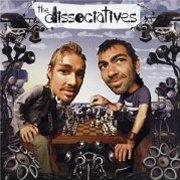 |
The Dissociatives (2004, 43.49) ***½/TTTT |
||
| We're Much Preferred Customers Somewhere Down the Barrel Horror With Eyeballs Lifting the Veil From the Braille Forever and a Day Thinking in Reverse Paris, Circa 2007slash08 Young Man, Old Man (You Ain't Better Than the Rest) |
Aaängry Megaphone Man Sleep Well Tonight |
||
Current availability:
Mellotron used:
The Dissociatives were an Australian duo comprising Daniel Johns from the vastly popular Silverchair and Paul Mac, a late-period Silverchair collaborator and producer. Rather unsurprisingly, The Dissociatives sounds like a cross between Johns' 'guitar rock' (for want of a better phrase) and Mac's electronica input, making for a slightly schizophrenic, though not unpleasant record. It's actually quite eccentric in places, which has to be a good thing, as the entire music industry slowly suffocates under the weight of the identikit drivel it spews out at an unthinking public. Thinking In Reverse reminds me of late '70s noo wave, while Paris, Circa 2007slash08 (yes, it is spelt like that) is more like Air on steroids, but there isn't a single track here that offended me.
Whoever plays the Mellotron (presumably Mac) plays it well and lots: the strings and flutes on Somewhere Down The Barrel are a warning shot across the bows, before the full-on, right at the front of the mix Mellotron on Horror With Eyeballs, not to mention the flute solo in Lifting The Veil From The Braille and... Listen, this is loaded with Mellotron, which is far more than you'd ever normally expect of a millennial 'pop' album. Result! And what's more, the key-click to be heard on many of the flute parts makes it almost certain that they're using a real machine, not copping out with the M-Tron or similar.
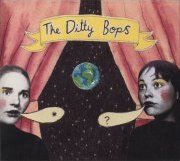 |
The Ditty Bops (2004, 40.42) ***/½ |
|
| Walk or Ride Wishful Thinking Ooh La La Sister Kate Breeze Black Night Gentle Sheep Pale Yellow |
Four Left Feet There's a Girl Unfortunate Few Short Stacks Wake Up [Hidden track] |
|
Current availability:
Mellotron (or Chamberlin) used:
The Ditty Bops are the duo of Abby DeWald and Amanda Barrett, plus whoever else is needed. They combine folk, singer-songwriterly stylings, ragtime, western swing and various other indigenous American styles into a slightly twee concoction that actually defies description. Their eponymous 2004 debut shifts through different moods over its length, from twee and bouncy (opener Walk Or Ride) through the aforementioned western swing influence (Sister Kate) to the appealing mixture of various folk styles on Four Left Feet, although nothing for anyone not into bright'n'breezy girly stuff.
Mitchell Froom plays keys, including some form of tape-replay instrument on Walk Or Ride, providing a faint flute part, only really audible during the song's dying seconds. Mellotron? Chamberlin? Who knows? You're certainly not going to buy The Ditty Bops for a couple of seconds of it in the background, anyway. Incidentally, the pair were married in California in 2008, seemingly one of the few states to (currently) recognise same-sex marriage. I can't understand why it's anyone else's business what domestic arrangements people prefer, but then, I'm not a right-wing religious bigot.
 |
Once We Were Born... (2008, 52.52) ****/TTT½ |
|
| Dance Choose Your Green Trota di Mare Orange and Turquoise In Search Little Man The Person The Man From My Mother's Brother |
Closing the Circle Burned By the Sun |
|
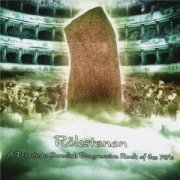 |
Rökstenen: A Tribute to Swedish Progressive Rock of the 70's (2010) ****/TT[Divine Baze Orchestra contributes]Här Kommer Natten |
Current availability:
Mellotron used:
The Divine Baze Orchestra are a new Swedish band who've got that retro hard rock/prog thing down to a T - appropriate, given my ratings system... Once We Were Born... is a surprisingly varied record, going by many of the band's contemporaries, with jazz and quite strong blues influences creeping in under the radar, although I'm not so sure the latter actually works in this context. Top tracks include opener Dance, with its ripping Hammond intro and Closing The Circle, although it's all good, frankly.
Daniel Karlsson plays keys, including Mellotron, with strings and/or flutes on all the highlighted tracks above. The only reason this doesn't get a higher 'T' rating is that he mostly uses it with some subtlety, to the point where some tracks only feature a few chords. All in all, then, this is a most worthwhile release, sounding wonderfully authentic for a new band. Progress? Progress schmogress.
See: Colossus Project
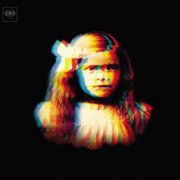 |
Forward in Reverse (2016, 51.08) ****/TT |
|
| Phlying Pharaoh Forward in Reverse Terrified in Paradise Brainless Something So Familiar Love at Second Sight Made to Believe Frey |
Mindgasm Fly Above the Radar I Would if I Could But I Can't Say it to Me Anyway |
|
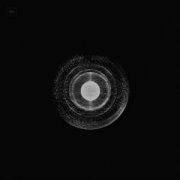 |
Alter Echo (2020, 46.17) ****½/TTThe RicochetIn The Blood Boy Doom The Middle California Rain Amelia Part 1: Nothing They Do They Do For You Part 2: The Path of Least Existence Part 3: Lights Out Part 4: All Saints Are Sinners Part 5: Alter Echo |
Current availability:
Mellotrons used:
Well, I've been banging on about Tim Christensen's Dizzy Mizz Lizzy for so long that it's almost an anticlimax finally being able to review them. But only almost... The backstory: formed in the late '80s, quickly became Denmark's most successful rock band, made one jaw-dropping, eponymous album (*****) and a disappointing follow-up, Rotator (***) before splitting. A brief reformation in 2010 (yes, I was there) has led to a 'proper' one, which I only discovered by accident, rooting around on the Internet.
2016's Forward in Reverse is the first fruit of the band's second round, better than Rotator, yet less potent than their debut, probably unsurprisingly. I'm sure it'll take several plays to assimilate properly, but an initial listen suggests that highlights include the sounds-like-their-debut Made To Believe, all three of the album's instrumentals, storming opener Phlying Pharaoh, the gentle Frey and the ripping Mindgasm and lengthy closer Say It To Me Anyway. In all honesty, there's nothing here as transcendentally, well, transcendental as first album high(est)lights Barbedwired Baby's Dream, Love Is A Loser's Game, Silverflame or the stupendous Glory, but it's unrealistic to expect that lightning might strike twice. Tim's Mellotron Conversion post-dates the original band, but it's no surprise that he gets some in here, with background strings on instrumental opener Phlying Pharaoh, Something So Familiar and Say It To Me Anyway, with slightly more upfront ones on the title track and Frey. Not one of the Great Mellotron Albums, then, but a worthy new entrant in the band's small discography.
Four years on, DML's second reformation album, Alter Echo, ups the ante, highlights including the excellent California Rain and all of the side-long Amelia, particularly parts three and four. The album also gets the 'fewest guitar solos on a hard rock album' award, Tim holding out until the seventh track before letting rip, then not doing so again. Mellotron strings on most tracks, barring The Middle and California Rain, probably at their most upfront on part three of Amelia, Lights Out, although they're mixed so far down on several tracks that it's difficult to know whether they're Mellotron or a generic strings patch, so I'm going on trust here. All in all, while generally dissimilar to their quarter-century old debut (gulp), an absolute triumph. Now to see them live again... Trip to Denmark, anyone?
See: Tim Christensen
Djam Karet (US) see: |
 |
 |
Laying Low & Inbetween (2001, 36.44) ***/T |
|
| Disappointment Book Laying Low and Inbetween 12 Gauge Microphone Dumbed Down Time and Again Temporary This One, That One Radiowave |
Sooner China Finally Falling |
|
Current availability:
Mellotron used:
Django Haskins' Regulars' second album, Laying Low & Inbetween, is a decent kind-of Americana/powerpop album, slightly compromised by intermittent songwriting quality issues. Best tracks? The jangly title track, Temporary and closer Finally Falling, maybe, although we could probably have done without the odd indie influence creeping in here and there.
Andrew Hollander plays a few seconds of cranky Mellotron strings on Dumbed Down, leaving the album's chief credit to China, with an outrageously clicky, clearly genuine string part. Splendid! It's hearing a Mellotron sounding this live that makes you realise how blandly it's usually recorded, even when it's genuine.
 |
Lament for the Numb (1993, 36.42) ***½/T |
|
| Lament for the Numb Falling Off a Log Belle of the Ball The Expert Palace Bring the House Down Buried in the Backyard Maybe the Rain |
Belltower Love Over All Don't Hold Your Breath |
|
Current availability:
Mellotron used:
After a couple of early bands, Kiwi legend Dave Dobbyn went solo in the mid-'80s, 1993's Lament for the Numb (as Dave Dobbyn & The Stone People) being his third release, after a five-year gap, recorded with Elvis Costello's rhythm section. A decent singer-songwriter effort of the era, highlights include the propulsive Falling Off A Log, the downbeat Palace and closer Don't Hold Your Breath's bittersweet cynicism, but, truth be told, there isn't a bad track here, although I can't say I'm keen to hear the production on his '80s albums.
Producer Mitchell Froom plays uncredited Mellotron (and Chamberlin?), with tubular bells on Palace and upfront strings on Buried In The Backyard. Dobbyn is now Sir David (a ludicrous British Empire hangover, but few recipients turn these gongs down) and has, like all successful Kiwis, relocated to Australia. Three later albums credit Mellotron, but I've slung them all into the sample dungeon.
See: Samples etc.
 |
7" (1974) ***/TT The Ballad of Lucy Jordon Make it Easy |
Current availability:
Mellotron used:
Who'd have thought that Dr. Hook (& the Medicine Show) could release a single at the height of their powers which could so easily slip into obscurity? Their inability to make a hit from poet Shel Silverstein's heartbreaking lyric about a suburban housewife shouldn't be that surprising; the band were known for their sense of humour, but there are few laughs here. Musically it's the same old same old, but something about the song refused to resonate with the American public.
Someone (keys player Billy Francis?) slathers Mellotron strings all over the 'A', in clear 'string section replacement' mode; as a non-album single, presumably recorded as a one-off, perhaps no-one would stump up for the real thing? Anyway, we get clear, upfront in the mix, but not especially imaginative use, so take that as you will. Despite The Ballad Of Lucy Jordon's lack of profile, it's on 2020's three-disc Gold, but it's very rarely compiled, although Marianne Faithfull had a major European hit with it a few years later. Oh, and thanks to Peter for spotting this semi-obscurity.